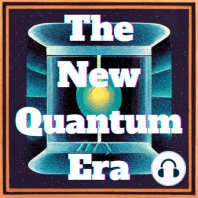59 min listen

Molecular and Subatomic Physics with David Mazziotti
Molecular and Subatomic Physics with David Mazziotti
ratings:
Length:
68 minutes
Released:
Sep 2, 2022
Format:
Podcast episode
Description
Title: Molecular and Subatomic Physics with David MazziottiDescription: Welcome to another episode of The New Quantum Era Podcast hosted by Kevin Rowney and Sebastian Hassinger. Today, they are joined by David Mazziotti, a physicist, and research team leader at the University of Chicago. He generously showed up with some deeply fascinating material for your consideration. Professor Mazziotti is a highly accomplished scholar, researcher, and mentor. This interview with David is a ringside seat on one of the most interesting recent research on molecular and subatomic physics that is now being explored by scholars using quantum computers. Today, David talks about how he got interested in quantum computing, his current findings and experiments, and his optimistic perspective about the possibility of breakthroughs in the near future of quantum.Key Takeaways:[6:13] David talks about his background.[11:32] David’s first professor role was teaching quantum chemistry.[12:30] David speaks about the first time he used quantum computing hardware to perform experimentation, like simulation of quantum chemistry.[14:42] David Talks about his first foray into quantum computing.[16:45] What measurements is David doing inside the quantum computer to register that data on the polytopes?[18:58] Where did the inspiration come from for using limited hardware with limited capabilities (from a gate and noise perspective) in a really creative way to do really sophisticated simulations? [24:19] What are the major engineering or commercial applications?[28:43] David talks about his collaboration on a couple of papers on a generalizable system for free a simulation of open quantum systems.[31:24] Is there something that can be done on a standard quantum computer to simulate open systems? Is new hardware needed?[33:40] Is it possible for David to speculate if there will be brand new algorithmic breakthroughs for clever classical optimization problems? [35:10] David shares the publication of a new paper on communications physics.[37:15] Can we make progress with noisy quantum computers?[40:39] David speaks about how he and his team ended up getting a spectrumscoptic noise “fingerprint” of each of their IBM Quantum computers on which they were doing an experiment. What does derive from the spectrum of the QC?[42:28] Is David programming the pulses or is he using gates?[43:42] Is the fingerprint like a qubit? [45:22] David believes that a more holistic perspective on the noise could be the way to control noise better.[48:30] David’s work has been on superconducting hardware, is it applicable to trapped ions or neutral atoms or Rydberg atom systems that are coming out in the next year? And hopefully to photonic systems down the road? [49:46] Is David’s work on superconducting hardware applicable to quantum sensing devices?[52:41] David shares his excitement about the evolution of quantum computing in the next couple of years.[56:19] For listeners who want to explore some of the code and are qiskit literate? Is any of the stuff that David has mentioned available open source style? [59:05] David speaks of his work on reduced density matrix theory. [1:00:26] If David could wish for any new hardware in the next year, what would he want? [1:04:53] Sebastian and Kevin share their insights from a mind blowing conversation with David Mazziotti.Mentioned in this episode:Visit The New Quantum Era PodcastLearn more about David Mazziotti’s work at his group’s website and check out their github repoTweetables and Quotes:“So a polytope is basically a convex object with a bunch of flat sides and on one side, there's this polytope that's forbidden, on the other side, one that's allowed, and then there's this hyperplane in the middle called the Borland-Dennis Inequality, and you just don't want the points to go through.” — David Mazziotti“In superconductivity, electrons form Cooper pairs, and these Cooper pairs of electrons all end up in a global quantum state and that
Released:
Sep 2, 2022
Format:
Podcast episode
Titles in the series (30)
The History of Superconducting Qubits with Steve Girvin: Steve Girvin is a pioneering condensed matter physicist and professor at Yale University who has played a central role in the development of superconducting qubits. He joins Kevin and Sebastian to discuss that history as well as recent, exciting progress by The New Quantum Era